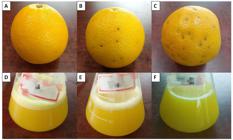Abstract
Among fruits and fruit products, oranges and orange juice are the most widely consumed worldwide. However, the effects of pest infestation of oranges on the quality of orange juice are not yet known. To evaluate the effect of the oriental fruit fly Bactrocera dorsalis on the antioxidant activity of orange juice, we measured changes in the vitamin C (Vc) concentration, total phenol content, and antioxidant activity of orange juice after the introduction of fruit fly eggs. Ten days after the eggs were introduced (larvae removed), the concentration of Vc in orange juice was 18.65 µg/mL, which was 9.16 µg/mL lower than that measured in healthy orange juice. In addition, the total phenol content decreased by 46.519 mg Gallic Acid Equivalents (GAE)/g to 9.748 mg GAE/g. Furthermore, the free-radical scavenging activity decreased from 22.297% to 5.393%. Correlation analysis indicated significant correlations between Vc concentration, total phenol content, and antioxidant activity of orange juice after B. dorsalis infestation. The decrease in Vc concentration, total phenol content and free-radical scavenging activity indicated that B. dorsalis changed the quality of orange juice by affecting the antioxidant activity of the juice after the oranges were infested.
Keywords:
fruit juice; pest infestation; Tephritid fruit fly; spectrophotometric method; DPPH

 Thumbnail
Thumbnail
 Thumbnail
Thumbnail

